【图文】上海中考英语复习
(完整)上海中考英语各语法点基础考点归纳,推荐文档
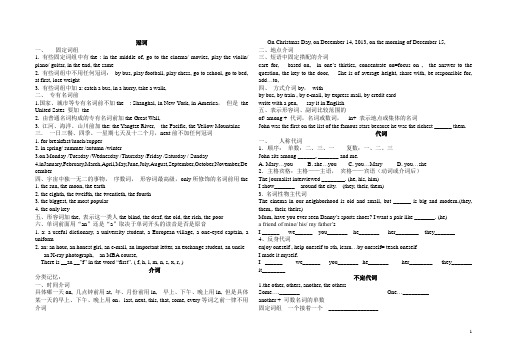
冠词一、固定词组1. 有些固定词组中有the : in the middle of, go to the cinema/ movies, play the violin/ piano/ guitar, in the end, the same2. 有些词组中不用任何冠词:by bus, play football, play chess, go to school, go to bed, at first, lose weight3. 有些词组中加a: catch a bus, in a hurry, take a walk,二、专有名词前1.国家、城市等专有名词前不加the : Shanghai, in New York, in America,但是the United Sates 要加the2. 由普通名词构成的专有名词前加the Great Wall,3. 江河、海洋、山川前加the: the Yangtze River, the Pacific, the Yellow Mountains 三.一日三餐、四季、一星期七天及十二个月,next前不加任何冠词1. for breakfast/lunch/supper2. in spring/ summer /autumn /winter3.on Monday /Tuesday /Wednesday /Thursday /Friday /Saturday / Sunday4.inJanuary,February,March,April,May,June,July,August,September,October,November,De cember四、宇宙中独一无二的事物,序数词,形容词最高级,only所修饰的名词前用the1. the sun, the moon, the earth2. the eighth, the twelfth, the twentieth, the fourth3. the biggest, the most popular4. the only key五、形容词加the, 表示这一类人the blind, the deaf, the old, the rich, the poor六、单词前面用“an”还是“a”取决于单词开头的读音是否是原音1. a: a useful dictionary, a university student, a European village, a one-eyed captain, a uniform2. an: an hour, an honest girl, an e-mail, an important letter, an exchange student, an unclean X-ray photograph, an MBA course,There is __an __”f” in the word “first”. ( f, h, l, m, n, s, x, r, )介词分类记忆:一、时间介词具体哪一天on, 几点钟前用at, 年、月份前用in, 早上、下午、晚上用in, 但是具体某一天的早上、下午、晚上用on。
九年级英语中考总复习3 教材内容回顾3上海牛津版

九年级英语中考总复习3 教材内容回顾3上海牛津版【本讲教育信息】一. 教学内容:中考总复习3 教材内容回顾3二. 具体过程:(一)短语1. cross the river ·过河2. call the police ·打电话报警3. deal with ·处理;应付4. happen to sb. ·发生在某人身上5. take a ferry ·乘渡轮6. wait for ·等候7. women tourists ·女游客8. shout at ·向……喊叫9. hold… out ·伸出;递出10. stare at ·盯着……看11. move through the crowd ·穿过人群12. go on ·进行;继续;上车/船/飞机13. run away ·逃跑14. start doing sth. ·开始做某事15. hurry aboard ·匆忙登船/登机16. be afraid of ·害怕17. a shop assistant ·商店营业员18. put… down ·放下19. get off ·下车/船/飞机20. in handcuffs ·带着手铐21. well done ·做得不错22. walk by ·走过;路过23. a big crowd of ·一大群的24. against the law ·违反法律的25. without permission ·未经允许的26. with great interest ·兴趣浓厚的27. something unusual ·不同寻常的事28. rob sb. (of sth.)·抢劫某人(某物)29. in time ·及时地30. want sb. to do sth. ·想要某人做某事31. tell sb. the truth ·对某人说实话32. steal sth. from sb. ·从某人处偷得某物33. a traffic jam ·塞车;交通阻塞34. take place ·发生;举行35. run towards ·朝……跑去36. switch…on/off ·打开/关闭开关37. lift… up ·把……拎起来38. trip on sth. ·被……绊倒39. just at that moment ·就在那时40. come up to sb. ·走上前来41. stay in hospital ·住院42. lie in bed ·卧床43. as soon as possible ·尽快(二)重点句型1. How long does it take for a ferry to cross the river?2. It takes time for sb. to do sth.3. It takes sb. time to do sth.4. What is the man doing with the bag?5. How is the man dealing with the dog?6. No one knew what was happening.7. What’s going on?8. But he hurried to an ice-cream shop.9. But he went to an ice-cream shop in a hurry.10. We went across the river on the next ferry.11. We took the next ferry to cross the river.12. Did anyone else help the two women?13. Yesterday, a daring robbery took place at the Pizza Palace.14. She lifted it up.15. May has a gift for learning languages.16. I went to the park for some exercise.17. I went to the park to take some exercise.18. I looked round but the driver had already left.19. I hope to find the driver as soon as possible.(三)单项填空()1. Is it safe __________the road?A. crossB. to crossC. crossingD. crossed ()2. The police __________ very helpful to us all the time.A. areB. isC. wasD. were ()3.An exciting thing happened _______ them yesterday.A. toB. forC. atD. in()4. I hope you________ tomorrow.A. to comeB. comesC. will comeD. came ()5. Did you ________play the computer games?A. used toB. use toC. usedn’t toD. use(四)选词填空1. We heard a big _________. A. steal2. The _____ looked at the man. B. handcuffs3. People ______ at the big man. C. aboard4. They always _____ money. D. dialed5. The man hurried ______. E. robbery6. My father ______ 110. F. stared7. I want to report a _______. G. crowd8. The man was in _________. H. argumentdialled stole stared argument aboard handcuffsYesterday there was a big _____________ near the ferry. Two women were shouting at a big man. They said that the man ______ their purse. The crowd _______ at them. When the bell rang, the man hurried ________. My father didn’t get onto the ferry. He hurried to a shop and _______ 110. Finally the policemen caught the man and the thief was in___________.(五)书面表达日记常用来记述自己一天生活中所发生的事情,故多用过去时或现在完成时,有时若表达自己对未来的打算也用将来时。
上海中考英语各语法点考点归纳
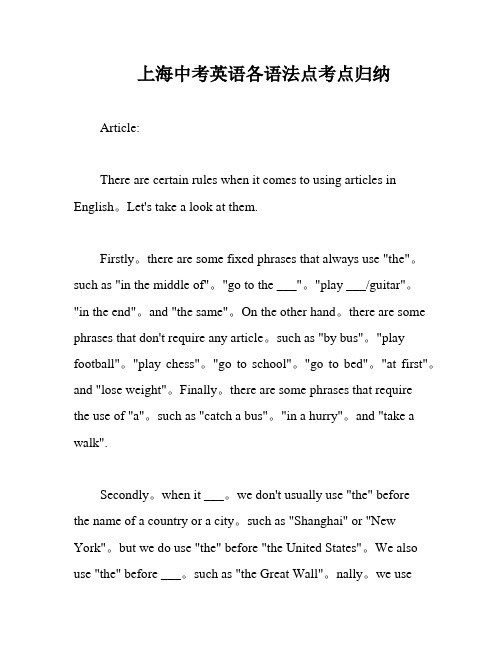
上海中考英语各语法点考点归纳Article:There are certain rules when it comes to using articles in English。
Let's take a look at them.Firstly。
there are some fixed phrases that always use "the"。
such as "in the middle of"。
"go to the ___"。
"play ___/guitar"。
"in the end"。
and "the same"。
On the other hand。
there are some phrases that don't require any article。
such as "by bus"。
"play football"。
"play chess"。
"go to school"。
"go to bed"。
"at first"。
and "lose weight"。
Finally。
there are some phrases that requirethe use of "a"。
such as "catch a bus"。
"in a hurry"。
and "take a walk".Secondly。
when it ___。
we don't usually use "the" beforethe name of a country or a city。
牛津上海版中考英语复习语法+阅读+Lesson+11讲义
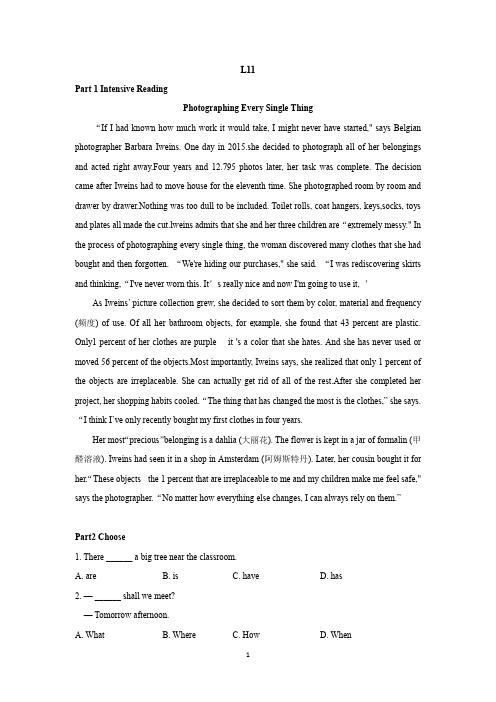
L11Part 1 Intensive ReadingPhotographing Every Single Thing“If I had known how much work it would take, I might never have started," says Belgian photographer Barbara Iweins. One day in 2015.she decided to photograph all of her belongings and acted right away.Four years and 12.795 photos later, her task was complete. The decision came after Iweins had to move house for the eleventh time. She photographed room by room and drawer by drawer.Nothing was too dull to be included. Toilet rolls, coat hangers, keys,socks, toys and plates all made the cut.lweins admits that she and her three children are“extremely messy." In the process of photographing every single thing, the woman discovered many clothes that she had bought and then forgotten. “We're hiding our purchases," she said. “I was rediscovering skirts and thinking,“I've never worn this. It’s really nice and now I'm going to use it, ’As Iweins’ picture collection grew, she decided to sort them by color, material and frequency (频度) of use. Of all her bathroom objects, for example, she found that 43 percent are plastic. Only1 percent of her clothes are purple -- it 's a color that she hates. And she has never used or moved 56 percent of the objects.Most importantly, Iweins says, she realized that only 1 percent of the objects are irreplaceable. She can actually get rid of all of the rest.After she completed her project, her shopping habits cooled.“The thing that has changed the most is the clothes,” she says. “I think I’ve only recently bought my first clothes in four years.Her most“precious”belonging is a dahlia (大丽花). The flower is kept in a jar of formalin (甲醛溶液). Iweins had seen it in a shop in Amsterdam (阿姆斯特丹). Later, her cousin bought it for her.“These objects - the 1 percent that are irreplaceable to me and my children make me feel safe," says the photographer.“No matter how everything else changes, I can always rely on them.”Part2 Choose1. There ______ a big tree near the classroom.A. areB. isC. haveD. has2. — ______ shall we meet?— Tomorrow afternoon.A. WhatB. WhereC. HowD. When3. I am ______ duty this week.A. inB. atC. onD. for4. — ______ did you buy the new bag?— Last Monday.A. WhereB. HowC. WhenD. Who5. ______ at seven this morning?A. What you didB. What did you doC. What you doD. What do you do6. I like fish, ______ my brother doesn't like it.A. SoB. orC. forD. but7. — Can you mend a video player?— No, I ______.A. mustn'tB. can'tC. may notD. needn't8. Mike speaks Chinese, ______ not much.A. soB. andC. orD. but9. They usually ______ TV in the evening.A. watchB. will watchC. are watchingD. watches10. Li Ying ______ on the ground for five hours before they finally found him.A. was lyingB. had lainC. had liedD. has lain11. It's ten o'clock in the evening. Let's ______.A. go to schoolB. get upC. have lunchD. go to bed12. Look! Li Ping and Li Lei ______ volleyball now.A. playB. playedC. are playingD. will play13. The box is light. Wang Ping can ______ it by herself.A. findB. watchC. carryD. learn14. — What are the girls doing?— They're ______ the music.A. listening toB. talking withC. coming fromD. looking for15. He is English, and ______.A. so does KateB. so Kate doesC. so is KateD. so Kate is16. There are many pictures ______ the wall.A. fromB. toC. aboutD. on17. There are about ____________ workers in that factory.A. five hundredsB. five hundredC. five hundred ofD. of five hundred18. My clock doesn't ______. Can you mend it for me?A. useB. moveC. walkD. work19. This street is much ______ than that one.A. straightB. straighterC. straightestD. more straighter20. Your room looks dirty. Will you please ______ it clean?A. takeB. makeC. letD. tidy21. — ______ children are there in your family?— Three.A. How muchB. How oftenC. How manyD. How old22. The book ______ me £20.A. paidB. spentC. tookD. cost23. Li Ping runs as ______ as Wu Dong.A. fasterB. fastC. fastestD. the fastest24. — ______ are you?— Twelve.A. How manyB. How muchC. How oldD. How far25. Li Lei always comes to school early and cleans the ______ for his classmates.A. houseB. windowC. wallD. classroom26. If it ______ tomorrow, I'll go by car.A. rainB. will rainC. rainsD. would rain27. Uncle Wang ______ in that factory since it opened in 1989.A. worksB. workedC. has workedD. will work28. Her mother told her ______ in bed.A. not readB. not to readC. don't readD. to not read29. The room is ______ dirty ______ we don't want to stay here.A. so; thatB. such; thatC. either; orD. as; as30. The medicine ______ cool, clean and dry.A. must keepB. must be keptC. must be carriedD. must be in31. I'm sorry I can't hear ______.A. what saying he isB. what he is sayingC. what saying is heD. what is he saying32. When the teacher came into the classroom, we stopped ______ cheerfully.A. LaughingB. laughedC. to laughD. laugh33. Monday is the ______ day of the week.A. secondB. twoC. threeD. third34. Would you know ______?A. who he isB. who is heC. whom is heD. whom he is35. — Oh, I've left my schoolbag in the classroom.— Don't worry, I'll ______ it for you.A. getB. carryC. bringD. take36. Have you received a letter from Jim ______?A. yetB. justC. neverD. ever37. — ______?— Quite well, thank you.A. What do you doB. What do you think of itC. How are you getting on with your EnglishD. Are you good at English38. There ______ sheep in the field.A. are muchB. is smallC. is a fewD. is a little39. — My parents have been to the United States.— Really? When ______ there?A. will they goB. did they goC. had they goneD. have they gone40. Miss Li is one of ______ in our school.A. a popular teacherB. more popular teacherC. most popular teacherD. the most popular teachers41. — Would you like to come to dinner tonight?— I'd like to, ______ I'm too busy.A. andB. ifC. soD. but42. — Will Mr. Smith be here soon?— I can't tell. Let's go and ______ when the train arrives.A. lookB. look forC. findD. find out43. ______ your help, we finished the work on time.A. ThanksB. Thanks ofC. Thank forD. Thanks to44. — May I ______ your motor?— Sorry. I ______ it to Mr. Smith the day before yesterday.e; lentB. borrow; repairedC. keep; borrowedD. lend; returned45. Johnson ______ football and knows a lot about it.A. is interested onB. is interested inC. is interesting aboutD. is interesting with46. — Where is Mr. Li Wei?— He's left a ______ saying that he has something important to do.A. excuseB. sentenceC. newsD. message47. ______ books must be produced for the children.A. Many thousandsB. Many thousands ofC. Many thousand ofD. Many thousand48. — Is it 21:00?— ______.A. Yes, it's nine in the eveningB. Yes, it's nine clocksC. Yes, it's nine in the afternoonD. Yes, it's nine hours49. I don't like this sweater. Please ______ me another.A. showB. tryC. putD. look50. Two ______ died of cold last winter in North Europe.A. hundreds old peopleB. hundred old peopleC. hundred old peoplesD. hundreds old peoplesPart3 ReadingAIn the United States, some people mark ballots( 选票 ) that bear the printed names of candidates. Others pull levers in voting machines. Americans are proud of their long history of holding free elections, but they did not i______1______ the process.Free elections were held in Athens, Greece, 2400 years ago. Some Europeans took part in local free elections d______2______ the Middle Ages. The secret ballot was first u______3_____ in 1858 in Australia.Today, voting is a new experience for many of the world’s peoples. Since World II, many w______4______ never had a voice in their government now take part in free elections.When India held its first national elections in 1951 and 1952, the process was so complicated that it took four months. F____5_____ people could read, so the ballots bore pictures that stood for the different parties. People who wanted to vote for Gandhi’s Congress party, for example, put an X under the picture of yoked oxen. In our hemisphere , there are also voters who cannot read. The Dominican Republic held its first free national election in 1962 with rainbow- coloured ballots. The different colors i_____6_______ the parties for people who could not read the candidates’ names.Today, computers are changing the way people vote. In 1974, Mexico set upa computerized voting system. In the future, people all over the world may beable to vote by touching computer screens. These screens could show candidates’ names, pictures, or party s_____7_______.Any change that encourages people to vote helps government work. Orgeon lets people vote by mail. Texas has voting in convenient spots such as malls. As long as people want to have a voice in the government , they will try new ways of voting.BA Mahogany Piano (II)But the payments came in, all 52 of them as agreed.-- sometimes with coins taped(Hl# 4ѣl)to a 3x5 inch card in the envelope. It was unbelievable!So, I put the incident out of my mind for 20 years.Then one day I was in Memphis on business, and after dinner at the Holiday Inn, I went into the lounge. As I was sitting at the(1)b having an after dinner drink, I heard the most beautiful piano music behind me. I looked around, and there was a lovely youn g woman playing a very nice piano.Being a pianist of some ability myself, I was completely surprised by her great(2)s and I picked up my drink and moved to a table beside her where I could listen and watch. She smiled at me, asked for requests, and when she took a break she sat down at my table."Aren't you the man who sold my grandma a piano a long time ago?"It didn't ring a bell, so I asked her to (3) e . She started to tell me, and I suddenly remembered. My Lord, it was her! It was the little barefoot girl in the feed sack dress!She told me her name was Elise and since her grandmother couldn't(4) a to pay for less, she had learned to play by listening to the radio. She said she had started to play in church where she and her grandmother had to walk over two miles, and that she had then played in school, had won many (5) a . She had married a lawyer in Memphis and he had bought her that beautiful piano.Something else entered my mind. “Look, Elise” I asked, “May I ask you what kind of (6) w __ is your first piano made of, the one your grandmother bought?It’s red mahogany” she said, “why?”My throat tightened. After quite a few minutes, I said, “I’m (7)p of you, but I have to go to my room, because men don’t like to be seen crying in public.。
2023年上海市中考英语试题及参考答案(word解析版)
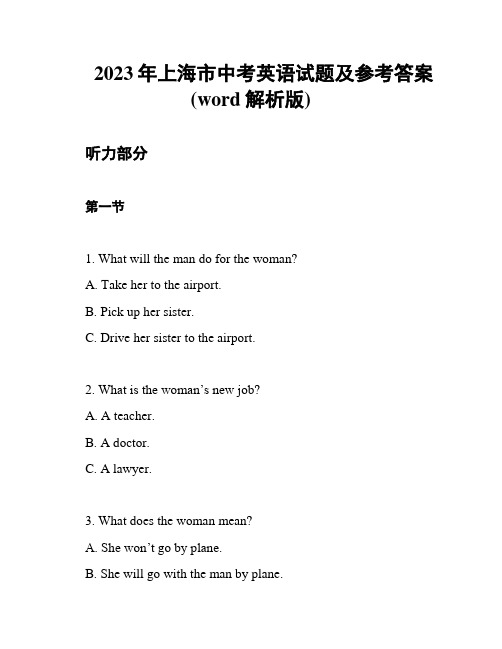
2023年上海市中考英语试题及参考答案(word解析版)听力部分第一节1. What will the man do for the woman?A. Take her to the airport.B. Pick up her sister.C. Drive her sister to the airport.2. What is the woman’s new job?A. A teacher.B. A doctor.C. A lawyer.3. What does the woman mean?A. She won’t go by plane.B. She will go with the man by plane.C. She will go by plane but not with the man. 第二节4. What are they talking about?A. A concert.B. A play.C. A movie.5. How long will the movie last?A. An hour and a half.B. Two hours.C. Two and a half hours.6. What will the woman do?A. Read a book.B. Take a nap.C. Watch TV.第三节7. What does Mary want to be?A. A teacher.B. A doctor.C. A scientist.8. What did Mary do yesterday afternoon?A. She went to the park.B. She went to the beach.C. She went hiking.9. Where is Jack now?A. In London.B. In Paris.C. In New York.阅读部分When you study abroad, you can learn about other cultures. You can understand how people from other countries live and work.Studying abroad can be expensive, but it can also be a good investment. When you are applying for jobs in the future, potential employers will appreciate the international experience you have gained.Another reason to study abroad is to improve your language skills. Learning a language in a classroom is one thing, but conversing with native speakers is another. If you study abroad, not only will you have the chance to practice your language skills, but also to pick up idioms and colloquialisms that ca n’t be taught in a textbook.10. What can you learn from studying abroad?A. How to study in another country.B. How to make more money.C. Other cultures and people.11. What will potential employers think if you have studied abroad?A. You are a good language teacher.B. You will do well in the job.C. You don’t have any experience.12. What’s the difference between learning in a classroom and conversing with native speakers?A. You can learn more in a classroom.B. You can only learn idioms and colloquialisms in a classroom.C. Conversing with native speakers can give you a more practical knowledge of the language.书面表达假设你们学校正在组织杂志社成员去采访英国留学生Ben,请根据以下问题提示,你是杂志社的一名记者,给Ben提出一些采访问题。
上海九年级英语知识点
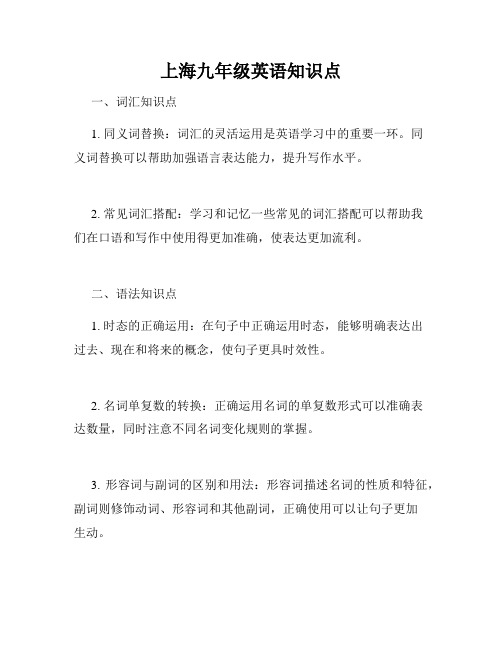
上海九年级英语知识点一、词汇知识点1. 同义词替换:词汇的灵活运用是英语学习中的重要一环。
同义词替换可以帮助加强语言表达能力,提升写作水平。
2. 常见词汇搭配:学习和记忆一些常见的词汇搭配可以帮助我们在口语和写作中使用得更加准确,使表达更加流利。
二、语法知识点1. 时态的正确运用:在句子中正确运用时态,能够明确表达出过去、现在和将来的概念,使句子更具时效性。
2. 名词单复数的转换:正确运用名词的单复数形式可以准确表达数量,同时注意不同名词变化规则的掌握。
3. 形容词与副词的区别和用法:形容词描述名词的性质和特征,副词则修饰动词、形容词和其他副词,正确使用可以让句子更加生动。
4. 介词的正确使用:正确使用介词可以帮助准确表达位置、方向、时间、原因等概念,增强句子的表述能力。
三、阅读理解技巧1. 主旨大意的把握:通过阅读理解题,我们需要准确把握文章的主旨大意,从而迅速定位答案,提高解题效率。
2. 猜词猜句:阅读中经常会遇到一些生词和生句,这时我们可以通过上下文来推测词义和句意,提高阅读理解能力。
3. 推理判断:阅读理解题中的推理判断类题目需要我们通过对文章逻辑的理解和推理,进行正确的判断。
四、写作技巧1. 开头结尾的写作技巧:一个好的开头和结尾能够吸引读者的注意力,给人留下深刻的印象。
2. 运用连接词:使用适当的连接词,可以使文章的段落结构更加紧密,句与句之间更加流畅。
3. 使用丰富的句型:使用不同的句型可以使文章更具变化性,提高写作技巧。
五、听力技巧1. 注意关键词:在听力材料中,关键词是我们捕捉信息和理解内容的关键,需要我们重点抓取。
2. 注意听力顺序词:顺序词如首先、然后、最后等在听力中起到先后顺序和时间顺序的作用,需要我们注意理解。
3. 提醒词的作用:一些提醒词如but、however等可以帮助我们理解上下文中的转折关系。
六、口语表达技巧1. 夸张法:适当运用夸张手法可以增加语言的表现力,让口语更加生动有趣。
上海中考英语核心词汇梳理及语法分类练习5(可编辑修改word版)

【词汇大练兵】Lst adj. 最后的,刚过去的adv. 最后v. 持续1)这是本学期最后的一周。
This is the last week of the term.2)炎热的天气将会一直持续到九月。
The hot weather will last until September.ter adv.以后,后来1)Have you got the news about the traffic accident? Latest2)我现在很忙,这事我以后再做。
I’m busy now and I’ll do it later\later on.ugh v. 笑我们不应该嘲笑社会上的残疾人。
We shouldn’t laugh at the disable in our society.4.leave (left, left)v. 离去;出发1)The train left five minutes ago. (保持原意不变)The train for five minutes. has been away2)---Tom, where is your Chinese homework?---Sorry, Mr. White. I hurried of this morning, and I it at home.A. forgotB. leftC. putD. took5.lend (lent, lent) v. 把……借给;借出Jack lent me his bicycle for an hour. (改为被动语态)Jack’s bicycle me for an hour. was lent to6.less adj. 较少的令我们惊讶的是,他比平时吃得少。
To our surprise, he is eating less than usual.7.lie (lay, lain) v. 躺,平躺说出lie 在下列几句话中分别表示什么意思We talk too much, love too little and lie too often. 撒谎Polaris happens to lie almost directly over the North Pole. 位于Then I thought it comfortable to lie or fish every day instead of studying. 躺These are only a few of the many questions whose answers lie in the Dark Ages. 隐藏Penguins lay their eggs on hard surfaces near coastlines, or they might dig burrows if the soil permits. 下(蛋)8.like prep. 像,跟……一样v. 喜欢1)I like classical music very much. (保持原意不变)I of classical music. am fond2) Do you want a cup of tea? (保持原意不变)you a cup of tea? Would, like9. listen v. 听10. little adj. 小;不足够 adv. 很少词汇辨析:a little/few; little/ few 1. Though she talks , she has made friends here.A. a little, a fewB. little, fewC. little, a fewD. few, a few 2. Ben has made quite mistakes in his test. Therefore, his mother is quite angry with his study.A. littleB. a littleC. fewD. a few11. live v. 居住1) 虽然他已大学毕业,但仍靠父母生活。
上海中考英语复习专题2动词(包含初中英语八种时态)专题(可编辑修改word版)
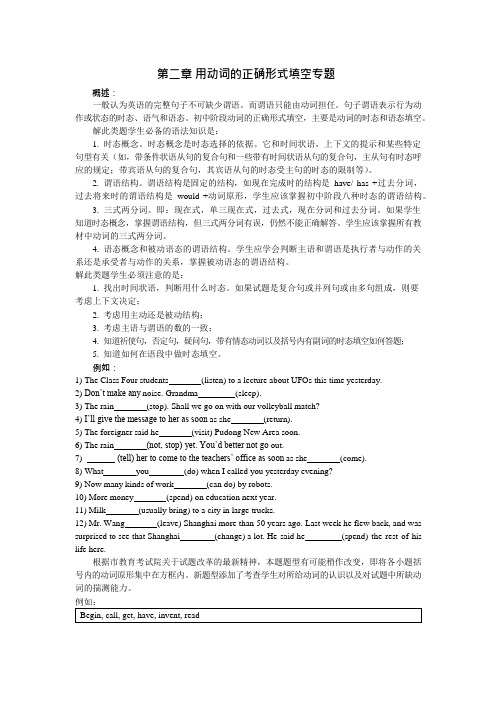
第二章用动词的正确形式填空专题概述:一般认为英语的完整句子不可缺少谓语。
而谓语只能由动词担任。
句子谓语表示行为动作或状态的时态、语气和语态。
初中阶段动词的正确形式填空,主要是动词的时态和语态填空。
解此类题学生必备的语法知识是:1.时态概念。
时态概念是时态选择的依据。
它和时间状语,上下文的提示和某些特定句型有关(如,带条件状语从句的复合句和一些带有时间状语从句的复合句,主从句有时态呼应的规定;带宾语从句的复合句,其宾语从句的时态受主句的时态的限制等)。
2.谓语结构。
谓语结构是固定的结构,如现在完成时的结构是have/ has +过去分词,过去将来时的谓语结构是would +动词原形,学生应该掌握初中阶段八种时态的谓语结构。
3.三式两分词。
即:现在式,单三现在式,过去式,现在分词和过去分词。
如果学生知道时态概念,掌握谓语结构,但三式两分词有误,仍然不能正确解答。
学生应该掌握所有教材中动词的三式两分词。
4.语态概念和被动语态的谓语结构。
学生应学会判断主语和谓语是执行者与动作的关系还是承受者与动作的关系,掌握被动语态的谓语结构。
解此类题学生必须注意的是:1.找出时间状语,判断用什么时态。
如果试题是复合句或并列句或由多句组成,则要考虑上下文决定;2.考虑用主动还是被动结构;3.考虑主语与谓语的数的一致;4.知道祈使句,否定句,疑问句,带有情态动词以及括号内有副词的时态填空如何答题;5.知道如何在语段中做时态填空。
例如:1)The Class Four students (listen) to a lecture about UFOs this time yesterday.2)Don’t make any noise. Grandma (sleep).3)The rain (stop). Shall we go on with our volleyball match?4)I’ll give the message to her as soon as she (return).5)The foreigner said he (visit) Pudong New Area soon.6)The rain (not, stop) yet. You’d better not go out.7)(tell) her to come to the teachers’ office as soon as she (come).8)What you (do) when I called you yesterday evening?9)Now many kinds of work (can do) by robots.10)More money (spend) on education next year.11)Milk (usually bring) to a city in large trucks.12)Mr. Wang (leave) Shanghai more than 50 years ago. Last week he flew back, and was surprised to see that Shanghai (change) a lot. He said he (spend) the rest of his life here.根据市教育考试院关于试题改革的最新精神,本题题型有可能稍作改变,即将各小题括号内的动词原形集中在方框内。
